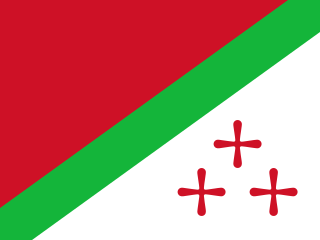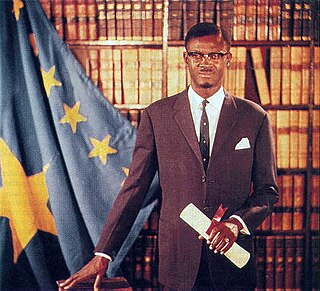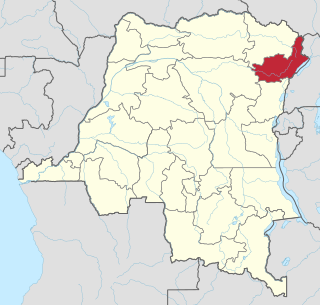
The United Nations Operation in the Congo was a United Nations peacekeeping force which was deployed in the Republic of the Congo in 1960 in response to the Congo Crisis. The ONUC was the UN's first peacekeeping mission with significant military capability, and remains one of the largest UN operations in size and scope.

The State of Katanga, also known as the Republic of Katanga, was a breakaway state that proclaimed its independence from Congo-Léopoldville on 11 July 1960 under Moïse Tshombe, leader of the local Confédération des associations tribales du Katanga (CONAKAT) political party. The new Katangese state did not enjoy full support throughout the province and was constantly plagued by ethnic strife in its northernmost region. It was dissolved in 1963 following an invasion by United Nations Operation in the Congo (ONUC) forces, and reintegrated with the rest of the country as Katanga Province.

United Nations Security Council Resolution 161 was adopted on February 21, 1961. After noting the killings of Patrice Lumumba, Maurice Mpolo and Joseph Okito and a report of the Secretary-General's Special Representative, the Council urged the United Nations to immediately take measures to prevent the occurrence of civil war in the Congo, even if the use of force is necessary. The Council further urged the withdrawal of all Belgian and other foreign military, paramilitary personnel and mercenaries not with the UN and called upon all states to take measures to deny transport and other facilities to such personnel moving into the Congo. The Council also decided that it would launch an investigation into the death of Lumumba and his colleagues promising punishment to the perpetrators.
United Nations Security Council Resolution 169, adopted on November 24, 1961, deprecated the secessionist activities in Katanga as well as armed action against United Nations forces and insisted that those activities cease. The council then authorized the Secretary-General to take whatever action necessary to immediately apprehend and deport all foreign military personnel, paramilitary personnel and mercenaries not with the UN and requested that the SG take all necessary measures to prevent their return. The Council then asked all member states to aid the Government of the Republic of the Congo and to prevent any actions which might contribute to the conflict there.
United Nations Security Council Resolution 226 was adopted unanimously by the United Nations Security Council on October 14, 1966. The Council urged the government of Portugal to prevent foreign mercenaries in the Portuguese territory of Angola from interfering in the domestic affairs of the Democratic Republic of the Congo (DRC).
United Nations Security Council Resolution 241, adopted unanimously on November 15, 1967, after reaffirming past resolutions on the topic, the Council condemned any act of interference in the internal affairs of the Democratic Republic of the Congo, in particular the failure of Portugal to prevent mercenaries from using its colony in Angola as a base of operations for armed attacks against the DR Congo. The Council called upon Portugal to put and immediate end to this and called upon all countries receiving mercenaries who had participated in the attacks against the DR Congo to take appropriate measures to prevent them from renewing their activities against any state.

United Nations Security Council Resolution 405, adopted on April 14, 1977, after considering the report delivered by the Special Mission established in Resolution 404 for Benin, the Council strongly condemned the attack by mercenaries in the country on January 16, 1977. It recalled Resolution 239 (1965) condemning any State which hires mercenaries to attack another and interfering in its internal affairs. The Council also warned against any State's attempt to destabilise another.

United Nations Security Council resolution 507, was adopted unanimously on 28 May 1982, after examining a report by the Security Council Commission on the Seychelles adopted in Resolution 496 (1981), the Council expressed its concern at the November 1981 coup attempt in the Seychelles by foreign mercenaries, including Mike Hoare, allegedly backed by South Africa, and the subsequent hijacking of an Air India plane.

United Nations Security Council resolution 1341, adopted unanimously on 22 February 2001, after recalling resolutions 1234 (1999), 1258 (1999), 1265 (1999), 1273 (1999), 1279 (1999), 1291 (2000), 1296 (2000), 1304 (2000), 1323 (2000) and 1332 (2000) on situation in the Democratic Republic of the Congo, the Council demanded that all parties to the conflict in the country implement disengagement plans and adopt withdrawal plans for foreign troops by 15 May 2001.

United Nations Security Council resolution 1468, adopted unanimously on 20 March 2003, after recalling previous resolutions on the situation in the Democratic Republic of the Congo, the Council welcomed an agreement on the establishment of a transitional government and requested an increased presence of the United Nations Mission in the Democratic Republic of Congo (MONUC) in the Ituri region in the east of the country amid escalating violence.

United Nations Security Council resolution 1493, adopted unanimously on 28 July 2003, after recalling all resolutions on the situation in the Democratic Republic of the Congo, the council extended the mandate of the United Nations Mission in the Democratic Republic of Congo (MONUC) until 30 July 2004 and raised its troop level from 8,700 to 10,800.

United Nations Security Council resolution 1522, adopted unanimously on 15 January 2004, after recalling all previous resolutions on the situation in the Democratic Republic of the Congo, the council welcomed efforts to establish the first integrated and unified brigade in Kisangani as a step towards forming a national army. It was the first Security Council resolution adopted in 2004.

United Nations Security Council resolution 1584, adopted unanimously on 1 February 2005, after recalling resolutions 1528 (2004) and 1572 (2004) on the situation in Côte d'Ivoire, the council, acting under Chapter VII of the United Nations Charter, strengthened an arms embargo against the country.

United Nations Security Council Resolution 1608, adopted unanimously on 22 June 2005, after recalling resolutions 1542 (2004) and 1576 (2004) on the situation in Haiti, the Council extended the mandate of the United Nations Stabilisation Mission in Haiti (MINUSTAH) until 15 February 2006 and increased its strength.

United Nations Security Council Resolution 1643, adopted unanimously on 15 December 2005, after recalling previous resolutions on the situation in Côte d'Ivoire, the Council extended an arms embargo and travel and financial restrictions against the country until 15 December 2006, and included a ban on the trade of diamonds.

United Nations Security Council Resolution 1702, adopted unanimously on August 15, 2006, after recalling resolutions 1542 (2004), 1576 (2004), 1608 (2005) and 1658 (2006) on the situation in Haiti, the Council extended the mandate of the United Nations Stabilisation Mission in Haiti (MINUSTAH) until February 15, 2007.

The 1981 Seychelles coup d'état attempt, sometimes referred to as the Seychelles affair or Operation Angela, was a failed South African–orchestrated coup to overthrow the government of Prime Minister France-Albert René in Seychelles and restore the previous president, James Mancham, to power.
Operation Rum Punch or Operation Rampunch was a military action undertaken by United Nations peacekeeping forces on 28 August 1961 against the military of the State of Katanga, a secessionist state from the Republic of the Congo in central Africa. UN troops arrested 79 foreign mercenaries and officers employed by Katanga with little conflict.
The Battle of Kabalo was fought at Kabalo by United Nations peacekeeping forces and Baluba militias from 7 April to 11 April 1961 against mercenaries and the gendarmerie of the State of Katanga, a secessionist state rebelling against the Republic of the Congo in central Africa. The Katangese forces attacked the town as part of a larger offensive meant to restore their authority in northern Katanga which was challenged by the Baluba. A United Nations Operation in the Congo peacekeeping contingent garrisoning Kabalo, acting under the authority of their mandate to prevent civil war in the country, resisted the initial attack and arrested 30 mercenaries in Katanga's employ. Armed Baluba repelled a Katangese ferry carrying troops as well as an armoured train. The next day the ferry returned but was sunk by UN forces. Fighting continued over the next few days between the Baluba and Katangese until the latter withdrew. The battle led to a deterioration of relations between the Katangese government and the United Nations Operation in the Congo.

The Katangese Gendarmerie, officially the Katangese Armed Forces, was the paramilitary force of the unrecognized State of Katanga in Central Africa from 1960 to 1963. The forces were formed upon the secession of Katanga from the Republic of the Congo with help from Belgian soldiers and former officers of the Force Publique. Belgian troops also provided much of the early training for the Gendarmerie, which was mainly composed of Katangese but largely led by Belgians and later European mercenaries.















